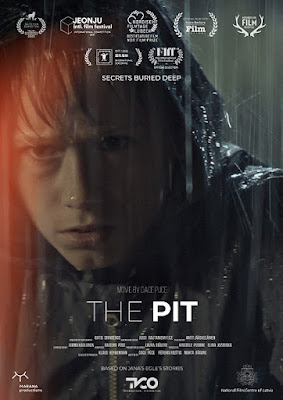This adaptation of Jana Egle’s short stories is sort of like a Latvian Short Cuts. It is also a coming-of-age story—a really dark one. Markuss is a tough kid to love, but we come to understand just how unloved he feels in Dace Puce’s The Pit, Latvia’s official Oscar submission for best international feature, which releases today in theaters and exclusively on Film Movement Plus.
Markuss is in big trouble, because he lured Emilija, a snotty little princess in his new neighborhood, into a pit in the woods and left her there. He was already a pariah in this provincial town. Now he is considered a monster. His grandmother, who is reluctantly serving as his guardian, seems to openly resent his presence. The rest of his local kin treats him with cold disdain, but their dysfunctional and sometimes abusive behavior behind closed doors is not so very different. His only friend is Sailor, the town outcast, whom his grandmother helps to support, despite her obvious contempt.
Some of the revelations Puce and co-screenwriter Monta Gagane have in store for viewers are fairly logical (a nicer term than predictable, in this case), but the way they emerge organically as the film progresses is still quite potent. There are some flashbacks, but they are employed judiciously and cleanly. After ten minutes, viewers will despise Markuss, but after seventy minutes, hearts will ache for him. It is a drastic dramatic reversal, but it is well-earned.
It is also helps that young Damir Onackis’ lead performance is remarkably powerful. He is raw and honest—quiet, but violent. This could very well be the best youthful performance of the year. Dace Eversa surprises us down the stretch as Grandma Solveiga, while the acutely human sadness of Indra Burkovaska’s Sailor is the perfect counterpoint to Markuss’s rage and confusion.
The Pit is not preoccupied with Latvia’s tragic Soviet history, but it still plays a role. Slight spoiler: Sailor went through puberty realizing he was transexual during the bad old days. It turns out the Communists did not ask people their pronouns. They just threw the “confused” into mental hospitals, which were notoriously brutal.
Apparently, this film is based on three Egle short stories, but Puce and Gagane seamlessly integrated them into one fluid, continuous narrative. As a result, the it never feels episodic or patched together. This film is neither light nor easy, but the redemption it provides is deeply satisfying. Very highly recommended, The Pit releases today (12/17) on Film Movement Plus.

